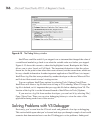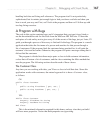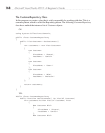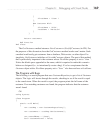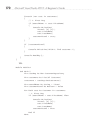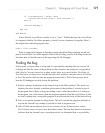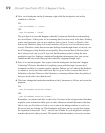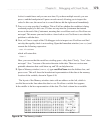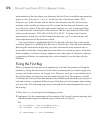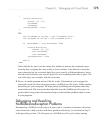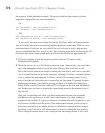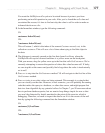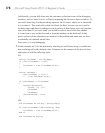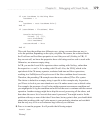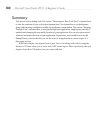
174 Microsoft Visual Studio 2010: A Beginner’s Guide
representation of the data where any characters that don’t have a readable representation
appear as dots. You can see “.J.e.a.n.” on the first line of the third column. .NET
characters are 16-bit Unicode, and the data for the character only fills the first byte,
resulting in the second byte being set to 00, causing the dots between characters you
see in the first column. If the data used another character set, such as Japanese Kanji,
you would see data in both bytes of the character. The hex representation of this data
in the second column is “00 4a 00 65 00 61 00 6e 00 20”. Looking at the Unicode
representation, which you can find at http://unicode.org/, you’ll see that the hex and
visual representation of the characters match.
You can see that I’ve highlighted the 00 20 at the end of the first line of the second
column in Figure 6-16, which proves that Jean is followed by a Unicode space character.
Knowing this information might help you share information with someone who is
responsible for the data, letting them know that there are extraneous spaces in the data.
Some computer or software systems might even use other types of characters, perhaps
a proprietary delimiter for separating data, and accidentally save the data with the
delimiter.
Fixing the First Bug
While you might have bad data and it might not be your fault, the prospect of fixing the
problem by fixing the data source is often illusive, meaning that you need to apply a fix
in your code. In this section, we’ll apply a fix. However, we’ll put a convoluted twist in
the solution where we discover a new bug when fixing the first. The purpose is twofold:
to illustrate the real-world fact that there are often multiple problems with a given piece of
code and to show a completely different type of bug that you will encounter when writing
your own code. The following steps lead you through the fix and subsequent discovery of
the new bug:
1. Press SHIFT-F5 to stop the previous debugging session.
2. Implement a fix by commenting out the contents of the foreach loop and replacing with
code that protects against extraneous spaces in the data, as follows:
C#:
var firstName = cust.FirstName.Trim();
var lastName = cust.LastName.Trim();
if (searchName == cust.FirstName)



